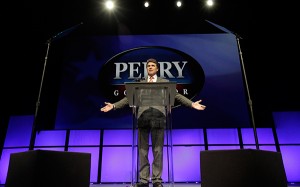
Texas Gov. Rick Perry speaks during the Texas Republican Convention in Fort Worth. June 2012. (AP Photo/LM Otero)
Texas’ fast-growing job market has become a popular talking-point for conservatives. They claim that the “Texas Miracle” is proof that a low-wage economy built on union-busting and limited public interest regulations works. This, they say, is America’s future.
But at The Washington Monthly, Phillip Longman takes a much closer look at Texas’ economy, and he finds that it’s nothing to which the rest of the country can or should aspire.
A few excerpts:
The first and most obvious question to ask about the Texas boom in jobs is how much it simply reflects the boom in Texas oil and gas production. Texas boosters say the answer is very little, and play up how much the Texas economy has diversified since the 1970s. And indeed, Texas has more high-tech, knowledge-economy jobs than it did forty years ago. But so does the rest of America, and the stubborn truth is that, despite there being more computer programmers and medical specialists in Texas than a generation ago, oil and gas account for a rapidly rising, not declining, share of the Texas economy…
The next big question is how much Texas’s growth in jobs just reflects its growth in population. For many decades, Texas has grown much faster in population than the U.S. as a whole, indeed about twice as fast since the 1990s. On its face, there is nothing particularly impressive about a rate of job formation that is just keeping pace with increases in population.But in the conservative narrative, this population growth is largely driven by individual Americans and businesses fleeing the high taxes and excessive regulation of less-free states. In other words, Texas’s rate of job creation is supposedly more a cause than a consequence of its population growth. If that were true, the Texas boosters would be right to brag. But among the many problems with this story is the reality that, even with an oil boom on, nearly as many native-born Americans are moving out of Texas as are moving in…
And despite all the gloating by Texas boosters about how the state attracts huge numbers of Americans fleeing California socialism, the numbers don’t bear out this narrative either. In 2012, 62,702 people moved from California to Texas, but 43,005 moved from Texas to California, for a net migration of just 19,697. That’s a population flow amounting to the movement of one village in a continental nation. Far from proving the merits of the so-called Texas model, it shows just how few Californians have seen fit to set out for the Lone Star State, despite California’s high cost of housing and other very real problems. The same is true for all but a handful of Americans living in other states. Net domestic migration to Texas peaked after Hurricane Katrina devastated Louisiana and Mississippi, and has been falling off ever since…
This comparatively low level of net domestic migration to Texas is consistent with another little-appreciated fact that runs counter to the conservative narrative about the Texas Miracle. It is that, for most Americans, as well as for most businesses, moving to Texas would not mean paying less in taxes, and for many it would mean paying more.
Oh yes, I know what you’ve heard. And it’s true, as the state’s boosters like to brag, that Texas does not have an income tax. But Texas has sales and property taxes that make its overall burden of taxation on low-wage families much heavier than the national average, while the state also taxes the middle class at rates as high or higher than in California. For instance, non-elderly Californians with family income in the middle 20 percent of the income distribution pay combined state and local taxes amounting to 8.2 percent of their income, according to the Institute on Taxation and Economic Policy; by contrast, their counterparts in Texas pay 8.6 percent.
And unlike in California, middle-class families in Texas don’t get the advantage of having rich people share equally in the cost of providing government services. The top 1 percent in Texas have an effective tax rate of just 3.2 percent. That’s roughly two-fifths the rate that’s borne by the middle class, and just a quarter the rate paid by all those low-wage “takers” at the bottom 20 percent of the family income distribution. This Robin-Hood-in-reverse system gives Texas the fifth-most-regressive tax structure in the nation.
Middle- and lower-income Texans in effect make up for the taxes the rich don’t pay in Texas by making do with fewer government services, such as by accepting a K-12 public school system that ranks behind forty-one other states, including Alabama, in spending per student.
Moving a business to Texas also turns out to have tax consequences that are inconsistent with the conservative narrative of the Texas Miracle. Yes, some businesses manage to strike lucrative tax breaks in Texas. As part of an industrial policy that dares not speak its name, the state government, for example, maintains the Texas Enterprise Fund (known to some as a slush fund and to others as a “deal-closing” fund), which the governor uses to lure favored businesses with special subsidies and incentives.
But most Texas businesses, especially small ones, don’t get such treatment. Instead, they face total effective tax rates that are, by bottom-line measures, greater than those in even the People’s Republic of California.
Longman goes on to discuss Texas’ lack of upward mobility, its falling per capita incomes and a number of other measures of prosperity. Read the entire story at The Washington Monthly.

